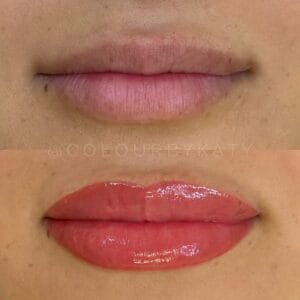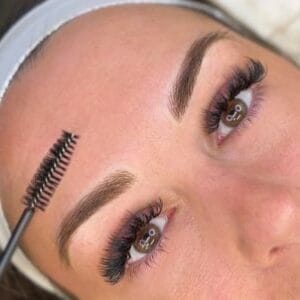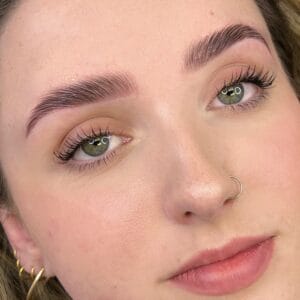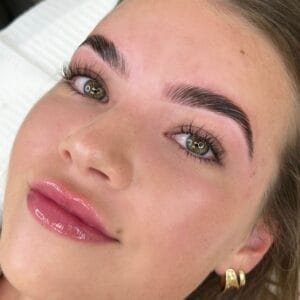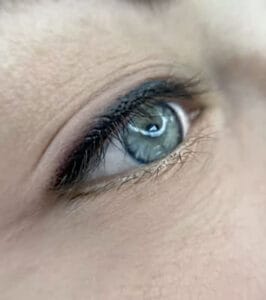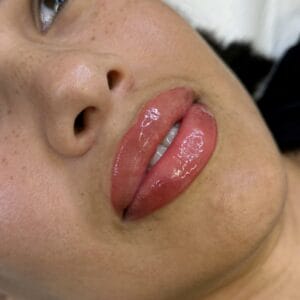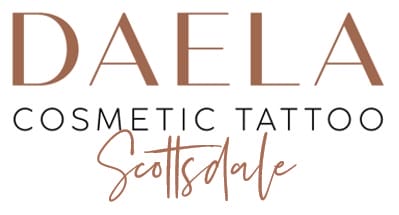DAELA Cosmetic Tattoo Scottsdale | Before and After Care
General Pre-Appointment FAQ's
Essential Skin Requirements
Before undergoing any cosmetic tattoo procedure, such as eyebrow, lip, eyeliner, freckle, or beauty mark treatments, it is imperative that your skin satisfies specific requirements.
The designated tattoo area must be free from the following:
- Acne
- Cuts or open wounds
- Infections
- Cold sores
If you are experiencing any of the following conditions, we kindly request that you provide photos or schedule an in-person consultation:
- Severe scarring
- Textured or uneven skin in the brow region
- Scarring from eczema
- Skin thickening
- Previous eyebrow tattoos you wish to conceal.
- Delicate, crepey skin in the designated area or fine lines spread throughout the region.
Consultations with our Scottsdale, Arizona team can be conducted via phone, email, text, or in person. This consultation helps us assess your eligibility for the procedure and determine the most suitable artist for your specific needs.
Q: Should I stop taking blood thinners before a permanent makeup procedure?
A: It is advisable to consult with your healthcare provider or the professional performing the procedure regarding the discontinuation of blood thinners. They will assess your medical history and the specific procedure to provide personalized recommendations.
Q: Do blood thinners increase the risk of bleeding during a cosmetic tattoo procedure?
A: Certain blood thinners can increase the risk of bleeding during the procedure. To minimize this risk, your healthcare provider may advise temporarily stopping these medications prior to the cosmetic tattoo procedure.
Q: Which blood thinners might require discontinuation before a cosmetic tattoo procedure?
A: Common blood thinners like warfarin, aspirin, and nonsteroidal anti-inflammatory drugs (NSAIDs) may need to be temporarily stopped before the procedure. Direct oral anticoagulants (DOACs) might also require adjustment. However, specific guidance should be obtained from your healthcare provider.
Q: How long before the cosmetic tattoo procedure should I stop taking blood thinners?
A: The timing for discontinuing blood thinners can vary based on the specific medication and individual circumstances. Your healthcare provider will provide you with the appropriate timeframe, usually around 5 to 7 days before the procedure.
Q: Can I make the decision to discontinue blood thinners on my own before the procedure?
A: It is crucial to consult with your healthcare provider before making any decisions regarding the discontinuation of blood thinners. They will consider factors such as your overall health and the type of cosmetic tattoo procedure to provide the safest recommendations for you.
Q: What should I do if I have concerns about blood thinners and my cosmetic tattoo procedure?
A: If you have concerns or questions about blood thinners and their potential impact on your cosmetic tattoo procedure, it is best to consult with your healthcare provider or the professional performing the procedure. They will be able to provide you with personalized advice based on your individual situation.
Caffeine, commonly found in beverages like coffee, tea, energy drinks, and even certain medications, acts as a stimulant. Although caffeine itself doesn’t directly thin the blood, it can influence blood pressure and heart rate. It’s crucial to understand the potential risks associated with high doses of caffeine before undergoing a cosmetic tattoo procedure.
Minimizing Risks: Moderating Caffeine Intake
- To reduce the chances of bleeding complications during your cosmetic tattoo procedure, it’s generally advised to avoid excessive consumption of caffeine. We require that you consume no caffeine the day of your treatment. Keep in mind that individual reactions to caffeine may vary due to personal tolerance and sensitivity.
- No, it is generally not recommended to get cosmetic tattoos if you are pregnant or breastfeeding.
- The safety of cosmetic tattooing during pregnancy and breastfeeding has not been extensively studied, and there is a lack of conclusive evidence regarding its effects on the developing fetus or the transfer of substances through breast milk.
- During pregnancy, your body undergoes hormonal changes that can affect the healing process and the way your skin reacts to tattooing. Additionally, there is a potential risk of infection or adverse reactions to the tattooing process, which could indirectly affect your pregnancy.
- At DAELA Cosmetic Tattoo, it is our policy not to provide services to those who are pregnant or breastfeeding.
Cosmetic tattooing is often described by clients as surprisingly comfortable thanks to advanced techniques, high-quality machines, and numbing products. While the process is generally well-tolerated, a few factors can make you a little more sensitive than usual. None of these are dealbreakers, but they’re good to know so you can plan your appointment with confidence.
Menstruation
During your cycle, hormonal changes can increase your body’s pain sensitivity. That means the same treatment you’d normally breeze through might feel slightly more noticeable. Some clients also find they swell a bit more or heal a touch slower when tattooed during their period. Still, many people get beautiful results without issue, it’s just a matter of being aware of your own comfort level.
DAELA’s Take: If your cycle is like clockwork- schedule around it. If it is less than trustworthy on its arrival- don’t worry- just come to your appointment!
Cannabis Use
You might assume that cannabis will help you relax and dull pain, but it can actually have the opposite effect during tattooing. Cannabis can heighten sensory perception, making you more aware of discomfort. It can also increase anxiety in some people, which may make sitting through your session feel less calm than expected. For the smoothest experience, it’s best to avoid using cannabis right before your appointment.
DAELA’s Take: Skip it the day of your appointment, maybe up to 72 hours before if you are very sensitive to pain.
Putting It in Perspective
These factors – menstruation & cannabis – can make you a little more sensitive, but this is not a game changer. Cosmetic tattooing at DAELA is designed to be as comfortable as possible, with numbing products, private treatment rooms, and artists who are experts at keeping clients at ease. Most people report very minimal pain with cosmetic tattoo procedures, so, if you happen to have your appointment during your period or on a day you’ve used cannabis, your results will still be beautiful. You might just notice the procedure feels slightly different than it otherwise would.
The bottom line? You don’t need to rearrange your entire life around your appointment, but being mindful of these factors can help set you up for the smoothest, most comfortable experience possible.
Have Questions?
Before & After Care Instructions
Hydration Guidelines:
Living in the Sonoran Desert demands vigilant attention to hydration all the time.
- Dehydration is a common risk in our arid environment.
- The quality of your outcome relies heavily on well-hydrated skin.
- Dehydrated skin tends to be limp and resistant, hindering optimal results.
- To mitigate this, it’s essential to consume ample fluids such as water, juice, milk, or other hydrating beverages for the entire 48 hours before your appointment.
- Conversely, avoid dehydrating substances like pre-workout supplements, acne treatments, alcohol, and caffeine during this period.
- Additionally, consult your doctor about refraining from medications with diuretic effects leading up to your appointment.
Who is eligible for eyebrow tattooing?
To undergo eyebrow tattooing, which includes these services: microblading, nanoblading, machine nano brows, ombre powder brows and combo brows, you must meet the following criteria:
- You cannot be pregnant or breastfeeding.
- You must be 18 years of age or older.
If you have previous eyebrow tattoos, a consultation is required.
If you have heavy scarring, textured or bumpy skin, or very thin skin, a consultation is required.
Variable Timeframe:
- ANTIBIOTICS: The general rule for antibiotics is: You should have finished your antibiotic course for as long as you were on the course before having any tattoo procedure. For example: If you are on a 14-day antibiotic cycle then your appointment should follow no sooner than 14-days after you have completed your antibiotics. If you have a booked appointment and it becomes necessary to take antibiotics, please call us and reschedule using this time frame guideline!
6 Weeks Prior:
- Avoid using retinol products, acne treatments, or salicylic acid on the brow area.
- No steroid use of any kind: oral, injections, creams, or eye drops (for eyeliner).
- No brow growth serums.
1 Week Prior:
- No wrinkle relaxer injections or fillers around the site of your upcoming permanent makeup treatment. If it’s time for these injections, schedule them for just after the permanent makeup appointment.
- Discuss with your doctor the possibility of discontinuing blood thinners that have been prescribed by your doctor. After the treatment you can immediately begin taking them again. Please let us know what your doctor has suggested.
- Refrain from using any over-the-counter blood thinners like aspirin.
- Avoid sauna sessions and tanning.
- Discontinue the use of fish oil and Vitamin E.
72 hours prior:
- Special Note: The use of cannabis can heighten pain sensitivity significantly. It is always our goal to reduce pain and discomfort as much as we possibly can, so we suggest that cannabis products are not consumed within 72 hours of your appointment.
48 hours prior
- If you have a history of low blood Irion (anemia) take appropriate steps to ensure your blood iron levels are stable during the 48 hours prior to your procedure.
- Discontinue vitamins (except iron supplements) until after the treatment.
- Drink plenty of water with electrolytes.
24 Hours Prior:
- Avoid consuming alcohol, excessive caffeine, and painkillers.
On the Day of:
- Please do not consume caffeine products.
- Arrive with a makeup-free face.
Cleansing and Aftercare:
- On the first day, let your brows relax and do not wet, apply moisturizer, or touch them.
- From days 2 to 7, gently wash your eyebrows twice daily with water and an antibacterial soap like Cetaphil or Neutrogena. Use your fingertips to cleanse the area gently.
- After washing, moisturize by applying a small amount of aftercare ointment with a cotton swab. Avoid over-applying.
- Limit showers to 5-8 minutes, keeping your face/treated area out of the water as much as possible. Avoid excessive rinsing and hot water on the brows.
- Things to Avoid During Healing:
- Do not wear makeup in the brows for 10 days.
- Avoid scratching or picking the brows.
- Limit showers to 5-8 minutes and avoid excessive water exposure to the brows.
- Do not use acid or manual exfoliants on the brows.
- Avoid sweating in the brow area for 10 days.
- Stay away from swimming, saunas, UV exposure, tanning beds, acne products, hydroxy acids, laser light therapy, facials, threading, waxing, or removal products.
After Healing:
- Brow tattoos can last between 1 to 3 years, depending on lifestyle, skin type, and aftercare.
- Apply sunscreen with an SPF of 50 or greater to the brow area once completely healed.
- Avoid using chemical exfoliants on the brows.
- Do not undergo laser treatments near the brow area, as some lasers may alter the ink color.
- Additional brow makeup application will be completely up to you!
To undergo lip tattooing, you must meet the following criteria:
- You cannot be pregnant or breastfeeding.
- You must be 18 years of age or older.
Variable Timeframe:
- ANTIBIOTICS: The general rule for antibiotics is: You should have finished your antibiotic course for as long as you were on the course before having any tattoo procedure. For example: If you are on a 14-day antibiotic cycle then your appointment should follow no sooner than 14-days after you have completed your antibiotics. If you have a booked appointment and it becomes necessary to take antibiotics, please call us and reschedule using this time frame guideline!
- COLD SORES: If you have a history of cold sores, ask your doctor for a prescription for Acyclovir. Start taking it three days before your appointment and continue for three days after the procedure.
3 Weeks Prior:
- Avoid deep exfoliation treatments, like chemical peels.
- No wrinkle relaxer injections or fillers around the site of your upcoming permanent makeup treatment. If it’s time for these injections, schedule them for after the lip tattoo appointment.
1 Week Prior
- Discuss with your doctor the possibility of discontinuing blood thinners that have been prescribed by your doctor. After the treatment you can immediately begin taking them again. Please let us know what your doctor has suggested. Refer to our blood thinner FAQ for more details.
- Refrain from using any over-the-counter blood thinners like aspirin.
- Avoid sauna sessions and tanning.
- Discontinue the use of fish oil and Vitamin E.
72 hours prior:
- Special Note: The use of cannabis can heighten pain sensitivity significantly. It is always our goal to reduce pain and discomfort as much as we possibly can, so we suggest that cannabis products are not consumed within 72 hours of your appointment.
48 hours prior:
- Discontinue vitamins until after the treatment.
- Drink plenty of water with electrolytes.
24 Hours Prior:
- Avoid consuming alcohol, excessive caffeine, and painkillers.
On the Day of:
- Please do not consume caffeine products.
Cleansing & Care
- Clean your hands before touching your lips.
- Wash your lips before bed with lukewarm water and unscented soap or cleanser.
- Apply the aftercare balm provided by Daela Cosmetic Tattoo in a thin layer after cleaning.
- Repeat this process in the morning and evening for five days.
- Avoid over-saturating the lips with the healing balm and do not let them become too dried out.
Things to Avoid:
- Avoid consuming super spicy foods within the first 24 hours.
- Do not apply any lip makeup for one week, except for the healing balm provided.
- Avoid scratching, picking, or licking dry skin or flakiness.
- Keep foreign body fluids away from the lips for five days.
- Refrain from activities that cause extreme sweating for five days.
- Avoid swimming pools, hot tubs, or bodies of water for five days.
- Stay away from UV exposure, including tanning booths, for five days.
- Do not undergo massages, facials, or other skin treatments for five days.
- Avoid laser light therapy, as it can affect the pigment color of the lips.
- Do not use exfoliants, retinol acids, glycolic acids, or alpha hydroxy acids on the lips for 30 days after the appointment, as it may cause premature fading.
After Healing:
- Lip tattoos can last between 2 to 3 years, depending on lifestyle, skin type, and aftercare.
- Apply sunscreen with an SPF of 20 or greater on the lip area once completely healed.
- Avoid using chemical exfoliants on the lips, as it may cause fading.
Who is eligible for eyeliner tattooing?
- To undergo eyeliner tattooing, you must meet the following criteria:
- You cannot be pregnant or breastfeeding.
- You must be 18 years of age or older.
Variable timeframe:
ANTIBIOTICS: The general rule for antibiotics is: You should have finished your antibiotic course for as long as you were on the course before having any tattoo procedure. For example: If you are on a 14-day antibiotic cycle then your appointment should follow no sooner than 14-days after you have completed your antibiotics. If you have a booked appointment and it becomes necessary to take antibiotics, please call us and reschedule using this time frame guideline!
Chemotherapy + steroid treatments. Clients need to be off chemo for 6 months. Steroids must be completed a minimum 4 weeks prior to your appointment. If you were on steroids for an extended length of time (i.e. 6 months) then you must be off steroids for that length of time.
1 Month Prior:
- Avoid using retinols, acids, anti-aging products, or acne products on the upper lid.
- Refrain from using lash enhancement serums for one month prior to your appointment.
- No steroidal eyedrops
1 Week Prior:
- Avoid sauna sessions and tanning.
- Discontinue the use of fish oil and Vitamin E.
- Refer to our FAQ about blood thinners. It is recommended to stop taking blood thinners according to the suggested guidelines. If you are on prescribed blood thinners, consult your doctor and inform us of their advice.
2 Days Before:
- If you have a history of low blood Irion (anemia) take appropriate steps to ensure your blood iron levels are stable during the 48 hours prior to your procedure.
- You must have lash extensions removed two days before your appointment.
- Avoid consuming caffeine or alcohol within 24 hours prior to your appointment.
1 Day Before and Day of:
- Do not wear contact lenses during the appointment.
- Do not wear eye makeup to the appointment.
- Ensure you do not have a stye or any other eye infection or irritation, if you do, please reschedule!
How you will feel.
- Your eyelids may be slightly swollen for 24-72 hours, which is normal.
- To relieve swelling, you can apply a soft gel ice pack and take ibuprofen or Benadryl as needed.
- Do not pick or peel any scabs.
- Swelling and redness will decrease within 24-48 hours.
Cleansing:
- On the first night, splash your eyes with water to wash off any pigment residue. Pat dry gently with a clean tissue or towel.
- Wash the skin around the eyes twice a day (morning and night) using a gentle, unscented soap. Use your fingertips to cleanse gently and pat dry with a clean tissue.
- Apply the given aftercare product 2-3 times a day for up to 14 days for eyeliner (omit for lash line enhancement). Avoid petroleum-based products.
- Avoid using chemical exfoliants or heavy creams on the eyes, as they may cause fading.
- The color may fade approximately 30-50% lighter when the scabs fall off, which is normal. Additional color can be added during the touch-up session.
Things to Avoid:
- Avoid activities that cause sweating for three days.
- For two weeks, avoid applying any makeup to the eye area.
- Do not scratch or remove scabs, dry skin, or flakiness, as it can result in color loss.
- Avoid using Vaseline, Neosporin, and other petroleum-based products.
- Refrain from swimming in pools, hot tubs, or bodies of water.
- Stay away from UV exposure, including tanning booths.
- Avoid laser light therapy
Who is eligible for freckles and beauty marks tattooing?
To undergo freckles and beauty marks tattooing, you must meet the following criteria:
- You cannot be pregnant or breastfeeding.
- You must be 18 years of age or older.
Variable Time Frame:
- ANTIBIOTICS: The general rule for antibiotics is: You should have finished your antibiotic course for as long as you were on the course before having any tattoo procedure. For example: If you are on a 14-day antibiotic cycle then your appointment should follow no sooner than 14-days after you have completed your antibiotics. If you have a booked appointment and it becomes necessary to take antibiotics, please call us and reschedule using this time frame guideline!
2-4 Weeks Prior:
- Avoid using retinol products, acne treatments, or salicylic acid on the area to be treated for four weeks prior to your appointment.
- Refrain from deep exfoliation, such as chemical peels, in the area to be treated for two weeks prior to your appointment.
- Avoid filler or injections in the area to be treated for three weeks prior to your appointment.
1 Week Prior:
- Avoid sauna sessions or tanning.
- Discontinue the use of fish oil and Vitamin E.
- Refer to our FAQ about blood thinners. It is recommended to stop taking blood thinners according to the suggested guidelines. If you are on prescribed blood thinners, consult your doctor and inform us of their advice.
24 Hours Prior:
- Avoid consuming alcohol.
Day of Your Appointment:
- Avoid consuming caffeine.
- Ensure there are no acne spots, cuts, or open wounds in the area to be treated, please reschedule if need be.
- Do not work out on the day of your appointment.
- Arrive with a makeup-free face.
Cleansing & Care
- For the first 24 hours (Day 1), let the skin relax and do not wash or bathe the treated area.
- From Days 2 to 7, wash the area daily to remove bacteria, product buildup, oils, and dead skin. This does not remove the pigment.
- Gently wash your face each morning and night with water and an antibacterial soap like Cetaphil or Neutrogena. Use a light touch and fingertips to cleanse. Rub the area in a smooth motion for 10 seconds and rinse with water, ensuring all soap is rinsed away. Pat dry with a clean cotton pad. Avoid cleansing products containing acids or exfoliants.
- From Days 1 to 7, apply a small amount of aftercare ointment with a cotton swab, spreading it across the treated area. Avoid over-applying, as it can suffocate the skin and delay healing. The ointment should be barely noticeable. Do not apply the ointment on wet or damp tattoos.
- Limit showers to 5-8 minutes to avoid creating excessive steam. Keep your face or treated area out of the water while washing your body. At the end of your shower, wash your hair. Avoid excessive rinsing and hot water on the treated area. Try to avoid soap or water running over your brows, except during the initial cleanse.
Things to Avoid:
- Avoid wearing makeup on your face for 10 days.
- Do not scratch or pick at the treated area.
- Limit showers to 5-8 minutes and avoid long, hot showers for 10 days.
- Avoid using acid or manual exfoliants on the treated area.
- Do not use any topicals other than the provided healing cream.
- Avoid sweating, swimming, or using a sauna for 10 days.
- Avoid UV exposure or tanning.
- Refrain from using acne products or hydroxy acids.
- Do not undergo laser light therapy.
- Avoid facials for 30 days.
- Do not thread, wax, or use removal products on the treated area.
After You’ve Healed:
- Faux freckle tattoos normally last around 6 months, depending on lifestyle, skin type, and aftercare.
- Apply sunscreen with a sun protection factor (SPF) of 50 or greater once completely healed to protect against fading and discoloration caused by sun exposure or tanning beds.
- Avoid using chemical exfoliants, as they may cause fading.
- Refrain from doing laser treatments near your face, as some lasers may change the color of the ink.
- Additional makeup application may be required post-tattoo to achieve your desired look.
Who is eligible for 3D Areola Restoration?
To undergo 3D Areola Restoration, you must meet the following criteria:
You cannot be pregnant or breastfeeding.
You must be 18 years of age or older.
Before Your Appointment:
VARIABLE TIMEFRAMES:
You must be at least 12 weeks post-op with healed wounds before scheduling your appointment.
ANTIBIOTICS: The general rule for antibiotics is: You should have finished your antibiotic course for as long as you were on the course before having any tattoo procedure. For example: If you are on a 14-day antibiotic cycle then your appointment should follow no sooner than 14-days after you have completed your antibiotics. If you have a booked appointment and it becomes necessary to take antibiotics, please call us and reschedule using this time frame guideline!
1 Week Prior:
- Avoid sauna or tanning sessions.
- Refer to our FAQ about blood thinners. It is recommended to stop taking blood thinners according to the suggested guidelines. If you are on prescribed blood thinners, consult your doctor and inform us of their advice.
24 Hours Prior:
- Avoid working out, consuming caffeine, and alcohol.
Cleansing & Care
- Keep bandages on for 48 hours.
- Limit wearing a tight bra for the first 48 hours.
- Remove bandages after 48 hours and before touching or washing your tattoos, clean your hands thoroughly.
- Wash your areolas before bed with lukewarm water and unscented soap or cleanser.
- Apply the provided aftercare product in a thin layer after cleaning.
- Repeat the cleaning and aftercare process in the morning for 5 days.
- Avoid over-saturating with aftercare balm or lotion, but don’t let the area become too dried out either.
- After 5 days, switch to using unscented lotion for the next 2 weeks, such as Lubriderm or Cetaphil.
What to Avoid During Healing:
- Do not apply scented lotions or tanning lotions for 2 weeks.
- Avoid scratching, picking, or peeling any dry skin or flakiness.
- Keep foreign body fluids away from the tattoo for 5 days.
- Avoid activities that cause extreme sweating for 5 days.
- Stay away from swimming pools, hot tubs, or other bodies of water for 5 days.
- Avoid UV exposure, including tanning booths, for 5 days.
- Do not undergo laser light therapy near the tattooed area, as it may affect the pigment.
- Refrain from using exfoliants, retinol acids, glycolic acids, and alpha hydroxy acids on the area for 30 days after the appointment, as they can cause premature fading.
After Healing:
- Areola tattoos can last for many years, but the longevity depends on factors such as lifestyle, skin type, and aftercare.
- Apply sunscreen with an SPF of 50 or greater on the area if exposed to the sun or tanning beds.
- Avoid using chemical exfoliants on the areolas, as they can cause fading.
- Avoid laser treatments near the areola tattoo area, as some lasers may alter the ink color.
- Additional touch-ups may be required after a few years to maintain a fresh, bold, and beautiful look.
Who is eligible for scar camouflage tattooing?
- To undergo scar camouflage tattooing, you must meet the following criteria:
- You cannot be pregnant or breastfeeding.
- You must be 18 years of age or older.
- To undergo scar camouflage tattooing, you must meet the following criteria:
3 Months Prior:
- You must be at least 12 weeks post-op with fully healed wounds before scheduling the scar camouflage tattoo appointment.
Variable Timeframe:
ANTIBIOTICS: The general rule for antibiotics is: You should have finished your antibiotic course for as long as you were on the course before having any tattoo procedure. For example: If you are on a 14-day antibiotic cycle then your appointment should follow no sooner than 14-days after you have completed your antibiotics. If you have a booked appointment and it becomes necessary to take antibiotics, please call us and reschedule using this time frame guideline!
One Week Prior:
- Avoid sauna sessions and tanning.
- Refer to our FAQ about blood thinners. It is recommended to stop taking blood thinners according to the suggested guidelines. If you are on prescribed blood thinners, consult your doctor and inform us of their advice.
1 Day Prior and Day of :
- Avoid working out on the day of your appointment.
- Refrain from consuming alcohol.
- Refrain from consuming caffeine.
Cleansing & Care
- Limit the wear of tight clothing for the first 48 hours.
- Remove the bandages after 48 hours and clean your hands before touching the tattoos and washing them.
- Wash your new tattoos before bed with lukewarm water and unscented soap or cleanser.
- Apply the given aftercare product in a thin layer after cleaning.
- Repeat this process in the morning and continue for a minimum of 5 days.
- Avoid over-saturating the tattoos with aftercare balm and lotions, and don’t let the area get too dried out.
- After 5 days, use unscented lotion for 2 weeks, such as Lubriderm or Cetaphil.
Things to Avoid:
- Avoid applying scented lotions or tanning lotions for the first 2 weeks.
- Do not scratch, pick, or peel any dry skin or flakiness.
- Keep foreign body fluids away from or around the tattoo for 5 days.
- Avoid activities that cause extreme sweating for 5 days.
- Refrain from swimming in pools, hot tubs, or bodies of water for 5 days.
- Stay away from UV exposure, including tanning booths, for 5 days.
- Do not undergo laser light therapy, as it can affect the color of the tattoo.
- Avoid using exfoliants, retinol acids, glycolic acids, and alpha hydroxy acids on the area for 30 days after the appointment, as they can cause premature fading.
- Refrain from receiving massages, facials, or other skin treatments for 5 days.
After You’ve Healed:
- Exposure to the sun and tanning beds can cause fading and discoloration of the pigment. Once completely healed, always apply sunscreen (50 SPF or greater) if the area is exposed.
- Avoid using chemical exfoliants on the areola, as it may cause fading.
- Do not undergo laser treatments near the areola tattoo area, as some lasers can change the color of the ink.
Laser Tattoo Removal Pre-Care
Prepping your skin properly helps prevent irritation and improves your results. Here’s what to do before your laser tattoo removal session:
Avoid Sun Exposure – 2 Weeks Before
Keep the area out of the sun and skip tanning beds and self-tanner.
Daily SPF is essential, even on cloudy days.
No Irritating Skincare – 3 to 5 Days Before
Discontinue retinol, AHAs, BHAs, and exfoliating products on or near the tattoo.
No Hair Removal – 1 Week Before
Avoid waxing, plucking, or chemical hair removal in the area to be treated.
Hydrate & Moisturize
Keep your skin hydrated leading up to your appointment, but skip lotion on the day of.
Avoid Blood Thinners – 24 to 48 Hours Before
Unless directed by your physician, avoid aspirin, ibuprofen, fish oil, and alcohol.
Shave the Area if Needed
If your tattoo is in a hairy area, please gently shave the day before.
Clean Skin Only on Treatment Day
Arrive with clean, dry skin—no makeup, lotions, oils, or deodorants.
Let Us Know If:
You’ve had any changes in medical history or medication.
You have a history of keloids or unusual scarring.
You’re pregnant, breastfeeding, or have used Accutane in the past 6 months.
Laser Tattoo Removal After Care
Some mild blistering or oozing can sometimes happen after tattoo removal and brow tattoo removal — especially if it was done with laser. But it shouldn’t be extreme.
- Tiny blisters: normal for some people, part of healing.
- Mild oozing: clear fluid or slight white/ yellowish fluid is common right after.
- Redness and tenderness: expected.
NOT normal if:
- Blisters are large or painful
- Oozing is thick, very yellow, green, or smells bad (sign of infection)
- You have fever, chills, or severe swelling
Laser tattoo removal aftercare is crucial for proper healing and to minimize the risk of complications. Here are some general aftercare instructions you should follow:
Keep the Area Clean and Dry: Gently cleanse the treated area with mild soap and water. Pat dry with a clean towel.
Apply Ointment: Use a thin layer of antibiotic ointment or a healing ointment like Aquaphor to the treated area to prevent infection and keep the skin moist.
Cover with a Bandage: For the first 24 hours, keep the area covered with a sterile bandage to protect it from bacteria and friction.
Avoid Sun Exposure: Protect the treated area from sun exposure. Use a broad-spectrum sunscreen with at least SPF 30 when going outside to prevent hyperpigmentation.
Avoid Picking or Scratching: Do not pick at scabs or blisters that form, as this can lead to scarring and infection.
Stay Hydrated: Drink plenty of water to help your body heal.
Avoid Hot Showers and Baths: Use lukewarm water when showering and avoid soaking in baths, hot tubs, or swimming pools for at least 48 hours after the procedure.
Avoid Tight Clothing: Wear loose-fitting clothing to prevent irritation of the treated area.
Monitor for Infection: Watch for signs of infection, such as increased redness, swelling, warmth, or pus. If you notice any of these signs, contact your healthcare provider.
Pain Management: Over-the-counter pain relievers like ibuprofen or acetaminophen can help manage discomfort. Avoid aspirin, as it can increase the risk of bruising and bleeding.
Always follow any additional instructions provided by your healthcare provider or the clinic performing the procedure.
Laser Skin Treatment Pre-Care Guidelines
1. Avoid Sun Exposure (2 weeks prior)
Stay out of direct sun.
No tanning beds or self-tanners.
Use SPF 30+ daily if you’ll be outside.
2. Skip Active Skincare Ingredients (3-5 days prior)
Discontinue products with retinol, tretinoin, AHAs (glycolic, lactic), BHAs (salicylic), vitamin C, and benzoyl peroxide.
3. No Waxing, Threading, or Chemical Peels (1-2 weeks prior)
These treatments can irritate the skin and increase sensitivity to the laser.
4. No Injectable Treatments (like Botox or filler) (1-2 weeks prior)
Always let your provider know what treatments you’ve had recently.
5. Stay Hydrated
Well-hydrated skin responds better to treatment and heals faster.
6. Avoid Blood Thinners (if medically approved)
Avoid aspirin, ibuprofen, fish oil, and alcohol for 24–48 hours before treatment to reduce risk of bruising.
7. Come with a Clean Face
No makeup, lotion, perfume, or deodorant in the treatment area on the day of.
8. Let Your Provider Know If:
You are pregnant, breastfeeding, or have any skin conditions or medications that might affect treatment.
Laser Skin Treatment After Care
Non-ablative laser skin treatments require careful aftercare to ensure optimal results and minimize the risk of complications. Here are some general aftercare instructions:
Keep the Area Clean: Gently cleanse the treated area with a mild cleanser and lukewarm water. Avoid hot water and harsh scrubs.
Moisturize: Apply a gentle, hydrating moisturizer to keep the skin moist and promote healing.
Avoid Sun Exposure: Protect your skin from the sun. Use a broad-spectrum sunscreen with at least SPF 30, even on cloudy days. Wear a wide-brimmed hat and protective clothing when outdoors.
Avoid Heat and Sweating: Refrain from activities that cause excessive sweating, such as vigorous exercise, saunas, or hot tubs, for at least 24-48 hours after the treatment.
Do Not Pick or Scratch: Avoid touching, picking, or scratching the treated area to prevent irritation and infection.
Avoid Makeup: Refrain from applying makeup on the treated area for at least 24 hours, or as recommended by your provider.
Hydrate: Drink plenty of water to stay hydrated, which helps in the healing process.
Avoid Irritants: Stay away from products that contain alcohol, glycolic acids, and retinoids for a few days post-treatment, as they can irritate the skin.
Monitor for Adverse Reactions: Look out for any signs of infection or adverse reactions, such as increased redness, swelling, or pus. Contact your healthcare provider if you notice any of these symptoms.
Always follow any specific aftercare instructions provided by your healthcare provider or the clinic where you received the treatment.
Before Your Microneedling Treatment
For optimal results and to ensure a smooth healing process, follow these pre-care instructions:
6+ Months Before Treatment:
- If you have taken Accutane (Isotretinoin), you must wait at least 6 months before undergoing microneedling.
1+ Month Before Treatment:
- If you have undergone cancer treatment, consult your doctor first and wait at least 1 month post-treatment before inquiring about skin treatments.
2+ Weeks Before Treatment:
- Avoid cosmetic treatments such as chemical peels, lasers, and injectables for at least 2 weeks before your appointment.
1 Week Before Treatment:
- Avoid direct sun exposure (including tanning, beach/river days, and sunless tanners). Sunburned or overly tanned skin can be more sensitive.
- No waxing, depilatory creams (i.e., Nair), or electrolysis/laser hair removal.
3-5 Days Before Treatment:
- Discontinue retinoids, acids, and exfoliants (e.g., retinol, AHAs, BHAs, vitamin C, benzoyl peroxide, hydroquinone). These products can increase skin sensitivity.
24 Hours Before Treatment:
- Avoid blood-thinning agents such as aspirin, ibuprofen, alcohol, caffeine, and fish oil to reduce the risk of excessive redness or pinpoint bleeding.
- No shaving the day of treatment—please do this 24 hours prior to your appointment.
Day of Treatment:
- Arrive with clean skin, free of makeup, lotions, or oils.
- If prone to cold sores, consider taking an antiviral medication (such as Valtrex) to prevent an outbreak.
Microneedling Cannot Be Performed If:
- You are pregnant or breastfeeding.
- You have active cold sores, acne, or open lesions.
- You have active eczema or rosacea flare-ups.
- You have active cancerous cells or are currently undergoing cancer treatment.
By following these guidelines, you’ll set yourself up for the best possible results and a smooth healing process!
After Your Microneedling Treatment
Microneedling creates microchannels in the skin, so proper aftercare is essential for healing and achieving the best results.
For the first 24 hours:
- Avoid touching your face and keep your skin clean.
- Change pillowcases & bedding.
- Use only provided hydrating serums recommended by your provider (such as hyaluronic acid).
- No makeup, sunscreen, or active skincare ingredients (retinol, acids, or vitamin C).
- You may apply ice to help with any discomfort.
Days 2-7:
- Start to incorporate gentle skincare—hydrating serums, soothing moisturizers, and mineral-based sunscreen (SPF 30+).
- Avoid active ingredients for the first 3-5 days following your treatment. You may resume normal skincare once the skin is no longer sensitive or flakey/peeling.
- You may use mineral based skincare 24 hours after treatment however wait 3 days before wearing eye or lip makeup and 5-7 days before wearing heavy face makeup like liquid/cream foundations or concealers.
- Expect redness, dryness, and possible flaking—DO NOT pick or exfoliate.
- Avoid direct sun exposure and strenuous exercise that causes excessive sweating. (You may resume regular exercise 72 hours after your treatment time.)
Long-term care for best results:
- Always wear SPF daily to protect your skin and enhance results.
- Keep up with a hydrating skincare routine.
- Schedule treatments as recommended (usually a series of 3-6 sessions for optimal results spaced 3-4 or 4-6 weeks a part depending on how sensitive or reactive your skin is to the treatment).
